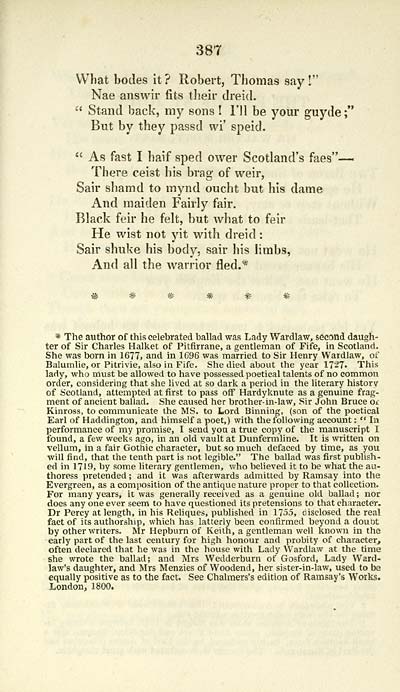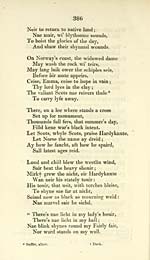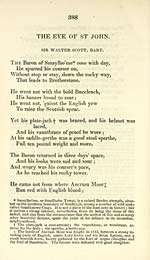Glen Collection of printed music > Printed text > Scottish ballads
(411) Page 387
Download files
Complete book:
Individual page:
Thumbnail gallery: Grid view | List view

387
What bodes it ? Robert, Thomas say I"
Nae answir fits tJieir dreid.
" Stand back, my sons I I'll be your guyde ;"
But by they passd w'l speid.
" As fast I half sped ower Scotland's faes"-—
There ceist his brag of weir,
Sair shamd to mynd oucht but his dame
And maiden Fairly fair.
Black feir he felt, but what to feir
He wist not yit with dreid :
Sair shuke his body, sair his limbs,
And all the warrior fled.*
* The author of this celebrated ballad was Lady Wardlaw, second daugh-
ter of Sir Charles Halket of Pitfirrane, a gentleman of Fife, in Scotland.
She was born in 1677, and in 1696 was married to Sir Henry Wardlaw, of
Balumlie, or Pitrivie, also in Fife. She died about the year n'2'J. This
lady, who must be allowed to have possessed poetical talents of no common
order, considering that she lived at so dark a period in the literary history
of Scotland, attempted at first to pass off Hardyknute as a genuine frag-
ment of ancient ballad. She caused her brother-in-law. Sir John Bruce oi
Kinross, to communicate the MS. to Lord Binning, (son of the poetical
Earl of Haddington, and himself a poet,) with the following account : " In
performance of my promise, I send you a true copy of the manuscript I
found, a few weeks ago, in an old vault at Dunfermline. It is written on
vellum, in a fair Gothic character, but so much defaced by time, as you
will find, that the tenth part is not legible." The ballad was first publish-
ed in 1719, by some literary gentlemen, who believed it to be what the au-
thoress pretended ; and it was afterwards admitted by Ramsay into the
Evergreen, as a composition of the antique nature proper to that collection.
For many years, it was generally received as a genuine old ballad ; nor
does any one ever seem to have questioned its pretensions to that character.
Dr Percy at length, in his Rehques, pubhshed in 1755, disclosed the real
fact of its authorship, which has latterly been confirmed beyond a doubt
by other writers. Mr Hepburn of Keith, a gentleman well known in the
early part of the last century for high honour and probity of character,
often declared that he was in the house with Lady Wardlaw at the time
she wrote the ballad; and Mrs Wedderburn of Gosford, Lady Ward-
law's daughter, and Mrs Menzies of Woodend, her sister-in-law, used to be
equally positive as to the fact. See Chalmers's edition of Ramsay's Works.
London, 1800.
What bodes it ? Robert, Thomas say I"
Nae answir fits tJieir dreid.
" Stand back, my sons I I'll be your guyde ;"
But by they passd w'l speid.
" As fast I half sped ower Scotland's faes"-—
There ceist his brag of weir,
Sair shamd to mynd oucht but his dame
And maiden Fairly fair.
Black feir he felt, but what to feir
He wist not yit with dreid :
Sair shuke his body, sair his limbs,
And all the warrior fled.*
* The author of this celebrated ballad was Lady Wardlaw, second daugh-
ter of Sir Charles Halket of Pitfirrane, a gentleman of Fife, in Scotland.
She was born in 1677, and in 1696 was married to Sir Henry Wardlaw, of
Balumlie, or Pitrivie, also in Fife. She died about the year n'2'J. This
lady, who must be allowed to have possessed poetical talents of no common
order, considering that she lived at so dark a period in the literary history
of Scotland, attempted at first to pass off Hardyknute as a genuine frag-
ment of ancient ballad. She caused her brother-in-law. Sir John Bruce oi
Kinross, to communicate the MS. to Lord Binning, (son of the poetical
Earl of Haddington, and himself a poet,) with the following account : " In
performance of my promise, I send you a true copy of the manuscript I
found, a few weeks ago, in an old vault at Dunfermline. It is written on
vellum, in a fair Gothic character, but so much defaced by time, as you
will find, that the tenth part is not legible." The ballad was first publish-
ed in 1719, by some literary gentlemen, who believed it to be what the au-
thoress pretended ; and it was afterwards admitted by Ramsay into the
Evergreen, as a composition of the antique nature proper to that collection.
For many years, it was generally received as a genuine old ballad ; nor
does any one ever seem to have questioned its pretensions to that character.
Dr Percy at length, in his Rehques, pubhshed in 1755, disclosed the real
fact of its authorship, which has latterly been confirmed beyond a doubt
by other writers. Mr Hepburn of Keith, a gentleman well known in the
early part of the last century for high honour and probity of character,
often declared that he was in the house with Lady Wardlaw at the time
she wrote the ballad; and Mrs Wedderburn of Gosford, Lady Ward-
law's daughter, and Mrs Menzies of Woodend, her sister-in-law, used to be
equally positive as to the fact. See Chalmers's edition of Ramsay's Works.
London, 1800.
Set display mode to: Large image | Transcription
Images and transcriptions on this page, including medium image downloads, may be used under the Creative Commons Attribution 4.0 International Licence unless otherwise stated. ![]()
| Special collections of printed music > Glen Collection of printed music > Printed text > Scottish ballads > (411) Page 387 |
|---|
| Permanent URL | https://digital.nls.uk/87742909 |
|---|
| Description | Scottish songs and music of the 18th and early 19th centuries, including music for the Highland bagpipe. These are selected items from the collection of John Glen (1833 to 1904). Also includes a few manuscripts, some treatises, and other books on the subject. |
|---|
| Description | The Glen Collection and the Inglis Collection represent mainly 18th and 19th century Scottish music, including Scottish songs. The collections of Berlioz and Verdi collected by bibliographer Cecil Hopkinson contain contemporary and later editions of the works of the two composers Berlioz and Verdi. |
|---|

